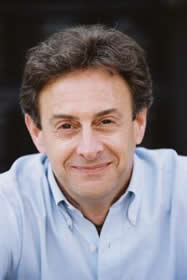 The US vs. John Lennon is a great documentary that has a deep look into political activities of John Lennon and his part in the anti-war movement.
The US vs. John Lennon is a great documentary that has a deep look into political activities of John Lennon and his part in the anti-war movement.
“The U.S. vs. John Lennon” is also a compelling reminder of why we love/loved John Lennon and why, 26 years after his death, he is still so sorely missed. Now after a successful theatrical release the DVD of The US vs. John Lennon is released.
Cinema Without Borders: John, how did you encounter this story and what inspired you to make The US vs John Lennon?
John Scheinfeld: David Leaf and I are gigantic Beatles fans. Over the years we’d read all the books and articles and thought we knew everything there was to know about the band and its members. So it was with great delight and excitement that we heard about the release of FBI documents from the Lennon file in 1997. The US government’s efforts to deport and/or neutralize Lennon struck us as an extremely compelling story (and it’s not often you can find such a powerful…and largely unknown…story about someone so famous). We felt it had to be told and we were determined to tell it. For years we pitched the film, but no one expressed strong interest. Finally, in a post-9/11, post-Iraq War world, people began to see the relevance of this story for a contemporary audience. In 2005 we made a deal with Lionsgate and, at long last, began work on the movie
CWB: What do you think caused the turning point in John Lennon’s life for him to join the anti war movement?
John: As we show in the film, John displayed a gradual and accelerating engagement with political issues throughout the 1960s. For example, there is a clip in our film from 1966 in which John, still a member of the Beatles, expresses his early view on the war in Vietnam. But I honestly believe that it was when he met Yoko that John’s political consciousness was fully raised. The extraordinary coming together of such passionate, free-thinking artists made possible their campaign for Peace.
CWB: Please tell us about the challenges you faced making this documentary.
John: Do you have a few days?! From selecting interviewees who would speak with credibility and authority…to screening over 100 hours of audio/visual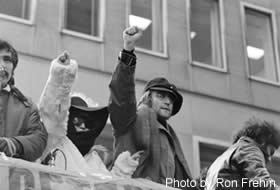 material for possible inclusion in the film…to many long nights in a small dark editing room, this was not an easy film to make. From working hard to earn Yoko’s trust…to making the hard creative choices necessary to bring the film down to a proper running time…not to mention struggling to find the best and most emotional ending to the movie…we had many obstacles to overcome. Perhaps none more daunting than securing clearances for everyone/everything in the film, especially the music (we have 40 songs in this movie – an amazing amount for any film let alone a documentary). At the end of the day, however, this was the most satisfying, rewarding and inspiring experience that I could imagine.
material for possible inclusion in the film…to many long nights in a small dark editing room, this was not an easy film to make. From working hard to earn Yoko’s trust…to making the hard creative choices necessary to bring the film down to a proper running time…not to mention struggling to find the best and most emotional ending to the movie…we had many obstacles to overcome. Perhaps none more daunting than securing clearances for everyone/everything in the film, especially the music (we have 40 songs in this movie – an amazing amount for any film let alone a documentary). At the end of the day, however, this was the most satisfying, rewarding and inspiring experience that I could imagine.
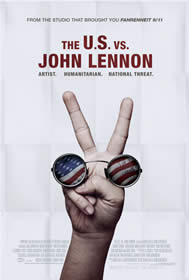 CWB: Are there any facts and issues about John Lennon’s political life that we may not know and we learn it through The US vs. John Lennon?
CWB: Are there any facts and issues about John Lennon’s political life that we may not know and we learn it through The US vs. John Lennon?
John: What the Nixon Administration did to Lennon was largely unknown back in the day because it took place in secret (at one point we considered calling the film, “The Secret War Against John Lennon”). ROLLING STONE magazine, in late 1974 broke a very small part of the story, so it wasn’t until the FBI documents were released (after a 16 year-battle led by Professor Jon Wiener of University of California-Irvine) that the overall story became clear. Avid Beatles fans, some reporters and critics may know what happened, but most Americans only had a cursory idea of what transpired. It is for these people that we made the film. In addition, when we say THE U.S. vs. JOHN LENNON we don’t mean just the case. Wanting to paint on a much broader canvas, we were equally interested in exploring the social, political and cultural landscape of America at the time. As filmmakers, it was critical to us that the audience understand the context in which this story unfolded. So this is a movie, not about startling revelations, rather about a deep understanding of the turbulent times and Lennon’s fight to do what he believed was right.
CWB: Did Yoko help you in finding the information you needed? Did she agree to appear in the film?
John: We could not…and would not…do this film without Yoko. We worked hard to secure her blessing to make this film and we worked hard to gain her trust. Once we accomplished these goals, Yoko was most gracious and generous in providing the 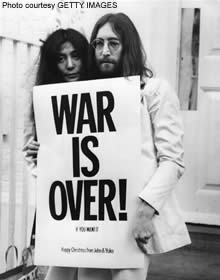 information and materials we needed to produce a definitive film. One of the highlights of this entire experience came after Yoko screened the film for the first time. She said to us privately (what she later said publicly at our screening at the Toronto Film Festival), “Of all the documentaries that have been made about John, this is the one he would have loved.”
information and materials we needed to produce a definitive film. One of the highlights of this entire experience came after Yoko screened the film for the first time. She said to us privately (what she later said publicly at our screening at the Toronto Film Festival), “Of all the documentaries that have been made about John, this is the one he would have loved.”
CWB: How The US vs. John Lennon did in its theatrical release and special screenings?
John: The past five months have been an incredible adventure for David and me. From the World Premiere of our film at the Venice Film Festival, to tastemaker screenings in New York, Washington and Los Angeles, to the enthusiastic audiences at the Telluride and London film festivals, through university screenings…the audience response was fantastic. Our U.S. theatrical run ended in late November with the film perched at #9 on the “All-Time Box Office list for political documentaries. It opened in theaters across the UK in December with Japan and other territories to follow in 2007. All very exciting!
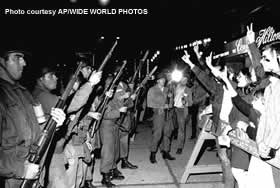 CWB: Is there any new material in DVD release?
CWB: Is there any new material in DVD release?
John: Yes, there is over 50 minutes of exciting new material on the DVD. There are deleted sequences, new sequences and an extraordinarily powerful emotional section featuring Yoko.
CWB: Please tell us about your future projects.
John: There are a number of projects in the works, but we really can’t talk about them now. Suffice it to say that David and I would like our future films to touch people and to provoke as much thought and debate as did THE U.S. vs. JOHN LENNON.

